- Home
- Jana Petken
Swearing Allegiance (The Carmody Saga Book 1)
Swearing Allegiance (The Carmody Saga Book 1) Read online
Swearing Allegiance
The Carmody Saga: Book 1
Jana Petken
© 2016 by Jana Petken
All rights reserved
No part of this book may be reproduced, stored in a retrieved system, or transmitted by any means without the written permission of the author. Swearing Allegiance is a work of fiction and bears no factual resemblance to the characters or what happens to them in the story.
Cover design by Adriana Hanganu
Also available from Jana Petken:
Award-winning The Guardian of Secrets
Screenplay The Guardian of Secrets
The Mercy Carver Series:
Dark Shadows
Blood Moon
Award-winning The Errant Flock
Amazon editorial review for Swearing Allegiance
Stunning book. Possibly my favourite so far this year. I highly recommend this historical fiction novel to anyone who enjoys a good read.
The novel follows the Carmody family through the Easter Rising in Ireland and their move to London during World War 1.
Wonderful story, well researched and beautifully written. I became totally immersed in the book and feel like I lived through the experiences with the family. Every character and scene was totally believable. Although the story followed the family members at war and those remaining in London the writing was so fluid it all tied together in one fantastic read.
This book seriously has it all, the politics of the time, the horrors of warfare in the trenches and on sea, romance and the hardships of those left behind to keep the home fires burning.
Absolutely loved this.
Acknowledgements
Many thanks to my editor, Shellie Hurrle;
Nick Wale;
Bob Martin;
my mother, Rena, always in my heart;
my Grandfather, David, an Irishman, if ever there was one;
and to those who have supported me and continue to encourage me
Part One
An Irish Uprising
Chapter One
Dublin
28 April 1916
Danny Carmody slouched against a wall. Wheezing with exertion and convinced that his heart was going to punch its way out of his chest, he pressed his palm against his jacket breast pocket and mumbled a prayer. “Holy Mother of Jesus and all the saints above, just breathe, Danny.”
He felt dizzy. Were it not for the hard, unyielding surface of the wall behind his back, he’d probably fall over, and wouldn’t he look like the eejit if he fainted in front of a crowd of men holding guns?
Putting his other hand to his clammy forehead, he gingerly touched his sore head. His thatch of curly hair, the colour of dark chocolate, was matted with glass fragments and bits of splintered wood from doors and window frames that had been shattered by bullets and mortar fire. Some of the debris had pitted his skin, and although he hadn’t looked in a mirror, he was sure he must look like a sickly lad inflicted with the measles.
His bright green eyes found the leaders of the uprising huddled together in what appeared to be the beginning of a heated debate. Five of the seven members of the Irish Republican Brotherhood Military Council had based themselves in the General Post Office. Their mission had been to occupy it for as long as possible and to make a grand statement of dissention to the British government. They had certainly done that, Danny thought. The English troops wouldn’t forget this week in a hurry. James Connolly, one of the leaders, sat uncomfortably on the ground with his ankle shot to pieces. He was surrounded by the other council members, who were doubled over, presumably trying to hear what Mr Connolly was saying. The great man, his hero, unable to continue the fight in its dying moments, Danny thought. It was the end of a dream for all of them, for he doubted that any man there would get out of the post office alive.
Out of breath, Danny laboured between thinking about what was going on in the GPO right now and everything that had happened to him on his way here. He was a lucky man to have made it into the building in one piece, having diced with death on several occasions. Yet he was energised, alert, and had never felt so alive, considering he’d spent the previous four days alternating between the GPO and the streets, running around like a blue-arsed fly from one rebel-held position to the next.
Closing his eyes, he conjured up images from the previous Monday, the day on which this glorious battle had begun. Although he had presumed at the time that he was attending a rally and Easter Monday parade with Pádraig Pearse’s republican volunteer army, he had suspected that something entirely different might happen. Feeling as proud as punch, he’d marched into Dublin with over one thousand men carrying rifles, in step behind Mr Pearse and in full view of those Dubliners who were out for what was a bank holiday. By the time they’d made their way northward through the maze of streets leading to the River Liffey, loud murmurings and a tangible universal stirring of excitement in the rank and file had become contagious. Faces of the men next to him and behind him reddened with the expectation of battle and victory over an empire, which had quashed their aspirations repeatedly. And at that moment, he knew he was going into the fight of his life.
When they arrived at the Liffey, the march took them west along the quays and across the river from the south bank to the north, using Butt Bridge. From there, it was only a short distance to Amiens Street, and on the way, they had passed the Irish Labour Party’s headquarters, Liberty Hall. On a board over the front entrance were the words “We serve neither King nor Kaiser, but Ireland.” He’d never felt so proud of being Irish.
At noon, they arrived at the post office and ran up the first flag within minutes. It was emerald green with a golden harp, and underneath the harp was an inscription in Gaelic lettering: “Irish Republic”. It was still flying today. On the right corner of the building was a flagstaff carrying the tricolour in green, white, and gold bars. Danny recalled that it had been raised straight after Pádraig Pearse’s proclamation of the establishment of the Provisional Government of the Irish Republic. The stupid and indifferent people in front of the building had stood there watching in almost complete silence – Jesus, their reaction had been as insipid as lukewarm piss.
Full of optimism and high spirits, he’d gone for more than forty-three hours without a wink of sleep, and that was a fact, for he’d counted back the hours since he’d last had a lie-down. It was as if an infusion of energy had been poured into him by the bucketful. So full up with powerful emotions, he’d had no room left for tiredness or fear of the British.
Where was the terror, he’d asked himself when he’d taken to the streets shouting “Freedom for Ireland!” like a screeching banshee on Easter Monday? Nowhere. Of course, the yelling had all been done inside his head, but he’d felt like a warrior just the same. Fear had been absent from all thought and sensation. It had still not appeared when guns were blazing at the Mount Street Bridge. What a victory, he thought. What a grand sight. British soldiers tumbling in front of his eyes as if they were wee tin figures being shot by a cork gun at the fairground, bullet casings falling to the ground like rain and him feeling every bit as proficient as a professional army man.
And yesterday, not even the sight of British reinforcements arriving in Dublin had enticed the fear within him to rise to the surface. He’d not felt a thing but the joy of James Connolly’s words calling for every Irishman to hold his rifle until the end. “Courage – we’re winning, boys!” the leader had boldly declared. “There never was a grander cause for men and women, and never was that cause more grandly served!”
Connolly’s words of praise and thanks had run through Danny like a sweet mug of hot chocolate
rushing down his gullet. The words had reinforced his resolve and belief in why he had joined up. Having only attended a few republican army meetings, which provided lessons in field drills and instruction on how to handle a rifle, he’d felt inadequate, clumsy, and not well informed as to what they were supposed to be planning. The moment that stuck in his mind at the last meeting was when Mr MacDonagh, one of the Irish Provisional Government members, took all of their names and wrote them down, just in case they were shot at some point. “Your relatives will be looked after,” he’d promised. Even hearing that had not made Danny feel the least bit scared of the British. Instead, it had made him feel powerful and important, and he wasn’t even eighteen years old yet.
It seemed more like weeks than days since he’d lied to his dad and mam about where he was going on Easter Monday. He’d not managed to get out of the house on Easter Sunday, but that was just as well, he thought now, for the planned parades had been cancelled at the last minute. Sure, he’d felt guilty on Monday, but not bad enough to stop the lies from spewing out of his mouth. “I’m off to see Jimmy Carson,” he told his parents. “He asked me to help fix his bicycle, and I said I would. He won’t get to his work if I don’t go, and a promise is a promise.”
His family weren’t daft, suspecting all along that he was involved with the rebels, but short of locking him up, which they hadn’t threatened to do, they could only spout their disapproval of his political ideas every five minutes. A couple of bloody frauds – that’s what his dad and brother Patrick were. They loved Ireland. His dad liked to recite poetic speeches about freedom and independence, and how fed up he was of bowing his back to the lash of the slave driver and feeling the dust of defeat and betrayal cover him. Of course that only came out after a couple of whiskeys. But where were his dad and Patrick on Monday past, when Ireland needed them? In the house not getting involved – they were a couple of slackers.
Jolting himself from his thoughts, he turned to a man twice his age and with not one but two rifles over his shoulders.
“Are you scared, Séamus?” Danny asked him.
“I’m bloody terrified, son, and what man in his right mind wouldn’t be?” Seamus grinned, but his lips were trembling.
“Have you done much shooting?”
“No, I’ve hardly fired my rifles,” Séamus said. “All those limeys outside do is lob bombs at us. We’ve got no real targets to shoot at. And you should see the nurse in the back room about that cut on your head.”
“I will. It was the Irish regiment from Inniskilling who did it to me. Here’s me thinking they’d be friendly, and then they opened fire with a machine gun. My head got a right belt from a bit of granite that fell on top of me. It’s not sore, though.”
“Well, that might be so, but it’s a deep cut all the same. Where have you just come from?”
“Everywhere and nowhere,” Danny said truthfully. “Mr Pearse ordered me to the College of Surgeons. I was supposed to deliver a message to Commandant Malin, but I couldn’t get near the building. The troops were crawling all over St Stephen’s Green. They outnumbered the bloody ducks in the pond ten to one. Mounted machine guns and snipers hid behind every window, just waiting for one of ours to step outside the college. Mr Pearse wasn’t surprised I couldn’t get in, though. He said getting through the British lines had been a long shot.”
“Sure, you’re lucky you managed to get back here with just a sore head,” Séamus said, patting Danny on the back.
“I nearly didn’t. I got caught,” Danny told him. “I thought I’d get away safely. I took various side streets towards Dame Street, but I didn’t notice I was being followed by a group of unfriendly locals. They grabbed me and denounced me as a spy to a British patrol that was skulking farther down the road.”
“Jesus, man. How did you get away?”
“They took me to Trinity College under guard, but I saved myself by swallowing the dispatch before they could catch me with it. One of the officers saw me chewing and wanted to know what I was eating. I took a bag of sweets out of my trouser pocket and offered him one.”
A few men standing close by had stopped what they were doing and were listening to Danny’s tale. Aware of all the eyes on him, Danny chuckled nervously. Still shaken with the ordeal, he thought his voice might sound nervous – God help him, as if dribbling his pants had not been bad enough.
“So what happened?” a man next to Séamus asked.
“Well, seems he didn’t like my apple and cinnamon chews, ’cos he refused my kind offer and threw the bag with the sweets across the room. Then he searched my person, vigorously, I might add. But he didn’t find any incriminating evidence on me, and the sergeant in charge ordered my release.”
Danny, enjoying a moment of adulation from men much older than he was, thought he’d continue a bit longer. “I’ll tell you, lads, it was a close shave. Had I not eaten that bit of paper, I’d be a dead man now – shot for my trouble.”
“So what’s it been like out there this past week?” a man with his face blackened with dirt wanted to know.
“I’ve seen some sights,” Danny told him. “Dead horses are littering the street, and the British have just left them there to rot.”
“They must be the ones that were ridden by those lancers we killed on Easter Monday,” Séamus suggested.
Nodding in agreement, Danny continued. “I’ll tell you what’s made my blood boil: Jacob’s Biscuit Factory in Wexford Street being surrounded by a mob of hostile people waving bloody Union Jacks and roaring at the volunteers inside.”
“Eejits. What were they shouting?” Séamus asked.
“Do you really want to know?” Danny asked the men.
When the crowd of men nodded, Danny carried on. “All right, but you’re not going to like it.”
“Get on with it,” one of the men said.
“They said, ‘C’mon out of there and get yourselves to France if you want to fight, ya load of bloody slackers!’”
“Bystanders,” Séamus said, spitting on the floor. “They’re a bunch of ungrateful traitors.”
“There’s worse than them on the streets,” Danny said. “Looters are everywhere. They’re emptying out the shops. Men, bent over double, are carrying sacks, taking everything from silver cutlery to clothes, bales of material, and golf clubs. Jesus, it looked like Christmas morning. Up the road, I even saw women running along the streets, dodging machine gun fire. Looking grand they were, in brand-new fur coats from Clerys department store. I spotted two women having a punch-up because one of them had more to show for her thieving than the other.”
At this, the men started to chuckle, and as a result, Danny’s voice became more animated.
“I ran right past another old wife making her way down North Earl Street holding the two bottom corners of her apron to form a pouch for shoes she had looted from the Cable Boot Company’s premises. And all the while she was ignoring the firing!”
“It’s not right,” Séamus said, using a surly tone. “We might be sacrificing our lives for Ireland, and some are sacrificing Ireland for material gains. Makes me feel bloody sick to my stomach.”
A few minutes later, Danny said to Séamus, “We can’t hold the British back, can we?”
“It doesn’t look like it, not since they placed those howitzers in the back of the Rotunda Hospital grounds,” Séamus said sadly. “The troops operating them hit us hard with incendiary shells last night. We dealt with fires as best we could with the hoses available, but they got more intense and came more often. We can’t get up on the roof now, and to make matters worse, the bastards have shut off the water supply. No, it’s not looking good. How in God’s name did you manage to get yourself inside here?” he asked, as though the question had just sprung to mind.
“I came in the back, through a hole in the wall. I slithered in like a snake right under their noses,” Danny told him.
“Good for you, but if I were a betting man, I’d say they want us to come out.” Grinning again, S
éamus placed a hand on Danny’s shoulder and gave it a fatherly pat. “Don’t you worry now, Danny boy – we’ll be all right as long as we don’t accept their invitation to leave.”
Danny stared at each of the leaders in turn. What were they talking about? he wondered. He couldn’t hear a word coming out of their mouths, which were moving as fast as those on the faces of actors on film screens.
He once again surveyed his surroundings. The sound of breaking glass, artillery, shouts of men issuing orders, and armoured vehicles outside made any kind of cohesive conversation impossible. The room, thick with smoke and shimmering with ribbons of bright dust particles streaking in through parts of the broken windows where there were no sandbags, was in shambles. The place was in a worse state than Jacob’s Biscuit Factory. He hadn’t been able to get in there with a dispatch either. He’d failed miserably. The British were tearing Dublin down building by building, crushing Irishmen while they were at it.
Now cut off from the other garrisons, Danny determined he would have to remain inside the post office until the very end. His courage and willingness to die for the cause still coursed through him. He wanted to feel valiant and undeterred by the bullets and bombs that shook his teeth and scrambled the thoughts in his brain. But even he, who had carried dozens of messages through back streets, crawling on all fours, dodging fire, and at times hiding in looted shops for hours, could see they were getting thrashed by far superior weaponry.
Tearing his eyes away from the men who were likely determining the fate of the Irish uprising, he lifted his eyes to the five riflemen standing on top of sandbags filled with coal and piled against the wall. They looked calm enough, but their ashen faces and unsteady fingers gripping quivering rifles spoke of defeat louder than any words ever could. The whole place had the air of a Greek tragedy, he thought, one in which they would all die heroes but be dead nevertheless.

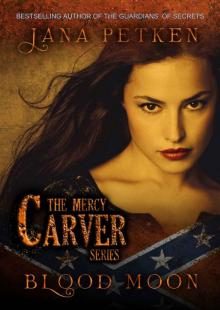 Blood Moon
Blood Moon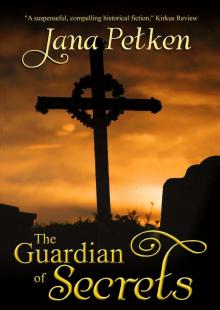 The Guardian of Secrets and Her Deathly Pact
The Guardian of Secrets and Her Deathly Pact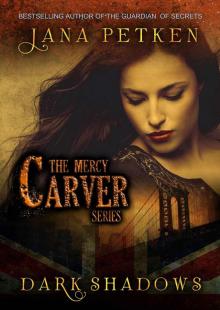 Dark Shadows
Dark Shadows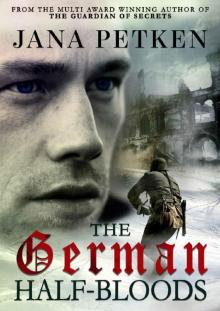 The German Half-Bloods (The Half-Bloods Trilogy Book 1)
The German Half-Bloods (The Half-Bloods Trilogy Book 1)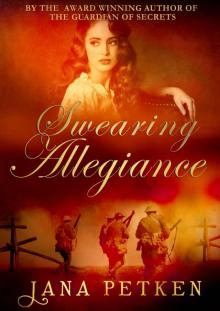 Swearing Allegiance (The Carmody Saga Book 1)
Swearing Allegiance (The Carmody Saga Book 1)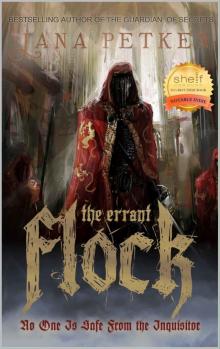 The Errant Flock
The Errant Flock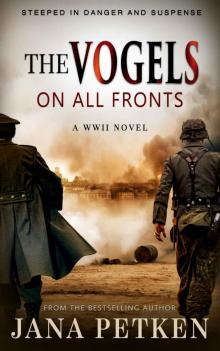 The Vogels: On All Fronts (The Half-Bloods Trilogy Book 2)
The Vogels: On All Fronts (The Half-Bloods Trilogy Book 2)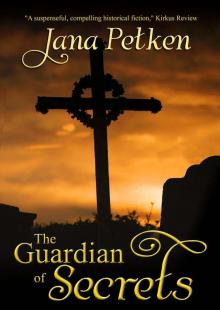 The Guardian of Secrets
The Guardian of Secrets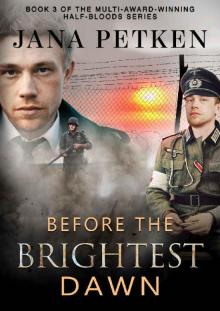 Before The Brightest Dawn (The Half-Bloods Trilogy Book 3)
Before The Brightest Dawn (The Half-Bloods Trilogy Book 3)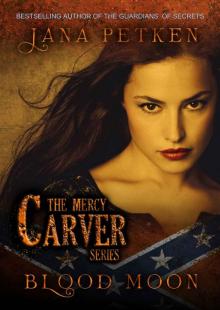 Blood Moon (The Mercy Carver Series Book 2)
Blood Moon (The Mercy Carver Series Book 2)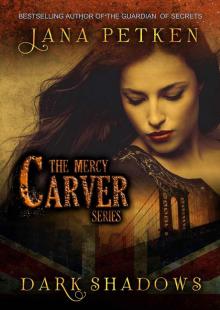 Dark Shadows (The Mercy Carver Series Book 1)
Dark Shadows (The Mercy Carver Series Book 1)